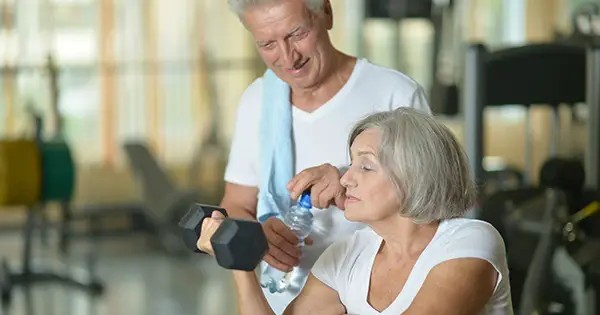An Irish fitness expert has advised older people to lift weights to reduce the risk of illness and injury.
David Nolan is a sports scientist currently studying for his PhD in applied strength and conditioning at DCU.
As you might expect, he is a keen advocate of exercise and living a healthy lifestyle.
Nolan wants to encourage older people to see their health as a priority and do what they can to keep themselves in good shape.
He said: “You cannot prevent yourself ageing, you can however prevent yourself getting old.”
Nolan believes that weight training as you enter your older years can reduce the risk of getting various illnesses usually associated with old age.
As well as protecting yourself from illness, it will also enable you maintain your independence and to live a more active lifestyle, such as being fit and strong enough to play with your grandchildren.
Nolan explained: “Resistance training for older adults is extremely beneficial for health.
“We know that those who engage in resistance training as older adults have a significantly reduced risk of mortality, a significantly reduced risk of falling, and they have significantly improved quality of life and independence then as well.”
Some people may read this and think they are too long in the tooth to begin making drastic changes to their lifestyle.
However, Nolan insists that it is never too late to make changes, and they don’t have to be dramatic.
He said: “It’s never too late to start resistance training. There is plenty of research to show that even in very elderly people over the age of 85, for example, that if they begin resistance training, they can make very significant increases in both their muscle size and their muscle strength.
“The benefits of resistance training don’t stop when you get old, that even in someone who has never resistance-trained before if they begin, they will see improvements.”
The best approach according to Nolan is to begin with gentle exercises that do not put too much strain on your body.
This soft approach is also more likely to keep people motivated, as to begin with the tasks are not too daunting.
The health expert explained: “You can start off gradually. Ideally, when it comes to physical activity, generally, more is better.
“It’s always better to be more active but starting off two sessions per week of maybe thirty to forty-five minutes can be more than adequate to see really significant improvements.
“The key would be to start off easy and progressively build up over time. You can start with just simple bodyweight or resistance bands exercisers. Even chair-based exercise can be enough to start off.
“So, that’s even using resistance bands while sitting on a chair or standing up and down from a chair several times and then as you get stronger, the key is that exercise is progressive and that the challenge gradually increases over time to accommodate for the increased level of strength achieved.
“And then over time, if they get stronger, they can then start engaging in machine-based resistance training or free weight resistance training also.”
Of course, cardio-based exercise is good for our health, particularly as we get older, but Nolan insists that strength-based training can be equally if not more beneficial.
He concluded: “We know that cardiovascular exercise is important for health, but we know that strength training or resistance training is equally, if not more important, for reducing your risk of mortality and disease.
“As you age, ideally, you would do both aerobic and strength exercise and those who engage in both and meet the recommended guidelines of both strength and aerobic exercise see the largest reduction in their all-cause mortality rate.”
